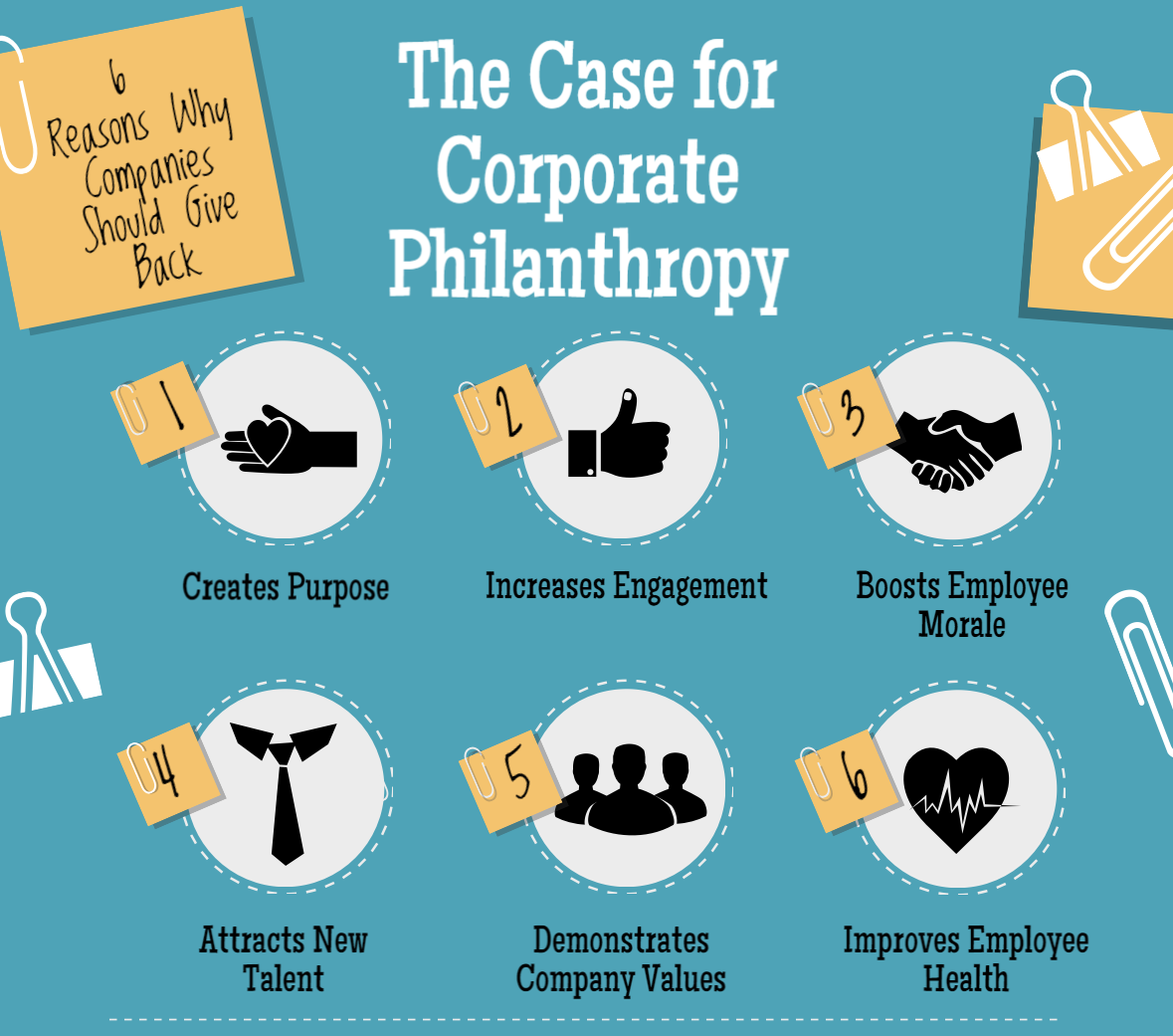Discovering Just How Business Philanthropy Shapes Brand Reputation and Consumer Commitment
Corporate philanthropy greatly affects brand name credibility and customer commitment. Business that engage in genuine charitable initiatives usually see a favorable shift in just how consumers perceive them. This placement of values fosters depend on and emotional links with audiences. The performance of these philanthropic initiatives can vary substantially. Comprehending what absolutely resonates with customers is vital for brands seeking to boost their social effect and market placement. What methods will arise as vital for future success?
The Evolution of Business Philanthropy
As organizations progressively identify their role in society, the advancement of corporate philanthropy has actually changed from mere philanthropic contributions to a tactical element of brand name identity. At first, firms engaged in philanthropy mostly for tax obligation benefits or to enhance their public picture. With time, this approach moved as stakeholders-- consisting of employees, customers, and financiers-- required an extra genuine dedication to social duty.
Organizations started straightening their kind campaigns with their core worths and business objectives, leading to more thoughtful and impactful contributions. This change has actually urged companies to purchase sustainable practices and area development, cultivating a feeling of objective that reverberates with customers.
Technical improvements have helped with transparency and involvement, enabling companies to showcase their kind initiatives much more efficiently. Consequently, company philanthropy has emerged as an integral component of company strategy, with companies accepting the opportunity to favorably influence culture while improving their overall brand name narrative.
The Influence of Philanthropy on Brand Assumption
While companies take part in humanitarian initiatives to promote social excellent, these initiatives substantially shape brand name perception amongst consumers. Business philanthropy can boost a brand's photo by associating it with favorable social effect and area involvement. Customers frequently regard brands that actively join charitable tasks as even more trustworthy and responsible. This understanding can affect acquiring choices, as consumers may like brand names that demonstrate a commitment to social concerns.

Building Emotional Connections With Offering
Company philanthropy offers as an effective tool for enhancing brand identity by linking business values with neighborhood requirements. Via critical giving, companies can foster community engagement and create shared values that resonate with consumers on an emotional level. This approach not only strengthens brand name reputation but also constructs lasting links in between organizations and their stakeholders.
Enhancing Brand Name Identification
When firms participate in humanitarian efforts, they not only add to social excellent however likewise create deeper emotional links with their target markets. By aligning their brand name with philanthropic causes, firms boost their identification and signal values that resonate with customers. This positioning creates a story that surpasses product or services, welcoming clients to take part in a common goal. As consumers increasingly focus on purpose-driven brands, firms that proactively take part in offering can distinguish themselves in a crowded market. Such campaigns promote a feeling of commitment among consumers who really feel personally linked to the brand name's values. Ultimately, corporate philanthropy ends up being an important device for enhancing brand identity, cultivating long lasting relationships based upon common beliefs and psychological involvement.
Fostering Community Interaction
Numerous research studies show that companies participating in community-focused kind campaigns can markedly reinforce psychological connections with their stakeholders. By purchasing neighborhood jobs and supporting social causes, services cultivate a sense of belonging and trust within the community. This involvement cultivates a positive brand photo, as customers value companies that demonstrate real concern for social concerns. Moreover, employees often really feel much more honored and inspired to be linked with a company that prioritizes neighborhood welfare. Consequently, customers are most likely to develop loyalty towards brand names that actively add to purposeful reasons. Eventually, promoting area interaction via philanthropy not only enhances brand name online reputation however also builds lasting psychological ties that benefit both the area and the company it offers.
Creating Shared Values
Just how can organizations successfully create common values that resonate with their stakeholders? Business can attain this by straightening their humanitarian efforts with their core mission and the interests of their communities. By involving in efforts that attend to neighborhood requirements, businesses promote psychological links with customers, improving brand name commitment. For circumstances, partnering with non-profits that show shared values reinforces the brand name's photo and demonstrates commitment to social duty. In addition, transparent interaction regarding these initiatives permits stakeholders to see the concrete effect of their payments. Eventually, by incorporating common values right into their company philanthropy, business not just boost their reputations but additionally grow enduring relationships with consumers, leading to raised loyalty and trust fund. This positioning is vital in modern-day customer decision-making.
Instance Researches: Successful Philanthropic Campaigns
Examining successful humanitarian campaigns discloses numerous strategies that boost brand reputation. Impactful area initiatives, ingenious collaboration versions, and long-term involvement approaches have actually confirmed reliable in cultivating favorable connections look at these guys with consumers. These case researches highlight the value of thoughtful business offering in attaining both social and business objectives.
Impactful Area Initiatives
Several companies have efficiently leveraged humanitarian projects to enhance their brand credibility while making a meaningful impact in their communities. A technology company introduced an electronic proficiency program in underserved neighborhoods, supplying training and sources that empowered local homeowners. This effort not just added to neighborhood advancement but additionally positioned the firm as a socially accountable leader. A major food firm applied a hunger relief campaign, partnering with regional nonprofits to distribute dishes to households in demand. This initiative enhanced area ties and promoted client commitment. Through these impactful initiatives, business have shown their dedication to social responsibility, successfully aligning their brand name values with the requirements of the neighborhoods they offer, eventually enhancing their total credibility.
Innovative Partnership Designs
The success of impactful area campaigns typically hinges on cutting-edge collaboration models that unite diverse stakeholders to resolve facility social challenges. Instance research studies illustrate just how firms, non-profits, and federal government entities can team up successfully. For instance, a multinational firm partnered with a local charitable to launch an education program, pooling sources and know-how to boost neighborhood proficiency rates. Another example included a technology company and a healthcare company signing up with pressures to develop a telemedicine remedy for underserved populaces. These partnerships not just enhanced the reach of kind initiatives but also enhanced the brands' track records by aligning their goals with neighborhood needs. Inevitably, cutting-edge collaboration versions function as a catalyst for meaningful modification and foster more powerful links between brands and their customers.
Lasting Involvement Methods

Measuring the ROI of Business Social Obligation
As companies increasingly purchase corporate social duty (CSR) campaigns, recognizing the roi (ROI) connected with these efforts ends up being essential. Determining ROI in CSR is multifaceted, often encompassing both quantitative and qualitative metrics. Monetary returns can be examined through raised sales, boosted brand name commitment, and boosted staff member morale, which can bring about greater efficiency. Additionally, firms may examine expense savings connected to sustainable practices, such as lowered waste or energy consumption.
Qualitatively, the effect of CSR on brand name online reputation can be evaluated through consumer perception research studies and social media sentiment evaluation. Surveys can provide understandings right into just how CSR tasks influence consumer loyalty and depend on. Benchmarking against industry requirements can aid organizations evaluate their CSR effectiveness - corporate philanthropy. Inevitably, a comprehensive technique to gauging ROI makes it possible for business to make educated choices about future CSR investments, lining up approaches with both economic performance and social impact
Consumer Expectations and Corporate Responsibility
Increasingly, customers anticipate companies to run with a solid feeling of company duty, watching honest practices as a prerequisite for brand name commitment. This change in assumption shows a growing recognition of environmental and social issues, leading customers to prefer brand names that align with their values. Customers are much more likely to sustain firms that take part in clear techniques, show sustainability, and add positively to their communities.
Additionally, social media sites magnifies these expectations, enabling consumers to share their viewpoints and experiences rapidly. Brands that fall short to meet these honest criteria take the chance of reaction, while those that welcome business duty usually appreciate improved credibility and customer commitment. As consumers require liability, firms need to incorporate company social responsibility into their core techniques, focusing her comment is here on moral behavior not just as a marketing method, yet as a fundamental aspect of their procedures. This alignment can eventually cause more powerful brand name fondness and sustained success in affordable markets.
Future Patterns in Company Philanthropy and Brand Loyalty
The landscape of business philanthropy is developing, influenced by the elevated consumer expectations bordering corporate obligation. Business are significantly incorporating social effect right into their core service techniques, not just as an ancillary activity. Future patterns suggest a shift toward transparency, with brands sharing comprehensive info regarding their humanitarian initiatives and their straight effects on areas.
Innovation is playing a vital duty, enabling real-time interaction between consumers and brands. Social network platforms assist in straight communication, enabling customers to voice their assumptions and hold brand names responsible. Additionally, more youthful generations, especially Millennials and Gen Z, focus on sustainability and ethical methods, driving businesses to adopt even more diligent strategies.
As company philanthropy comes to be associated with brand identification, business that authentically align their missions with societal requirements are likely to cultivate stronger client commitment. This convergence of values will eventually form the future of company credibility and customer partnerships in an increasingly diligent market.
Often Asked Inquiries
How Do Consumers Learn about a Business's Philanthropic Initiatives?
Customers uncover a firm's philanthropic efforts via numerous networks, consisting of social media sites, press releases, area events, and word-of-mouth. These methods assist in understanding, enabling people to engage with brands that line up with their rate of interests and values.
What Duty Does Worker Participation Play in Corporate Philanthropy?
Worker participation in corporate philanthropy boosts involvement, fosters a sense of possession, and strengthens group cohesion - corporate philanthropy. This participation often intensifies the influence of charitable initiatives, causing greater recognition and support for the company's humanitarian initiatives
Can Corporate Philanthropy Backfire on a Brand name's Credibility?
If perceived as opportunistic or insincere, company philanthropy can without a doubt backfire on a brand name's credibility. Unfavorable public understanding might occur, resulting in reduced depend on and loyalty among customers who prioritize authenticity in corporate activities.
Are Smaller Companies as Efficient in Philanthropy as Larger Companies?
Smaller sized companies can be similarly effective in philanthropy as bigger companies, commonly demonstrating agility and credibility. Their local efforts might reverberate extra deeply with neighborhoods, cultivating genuine links regardless of minimal resources compared to their larger counterparts.
How Can Firms Select the Right Triggers to Support?
Firms can select the right bring on by straightening their worths with neighborhood demands, assessing stakeholder rate of interests, and reviewing prospective impact. This tactical method cultivates credibility, enhances involvement, and reinforces links with customers and the wider community.
While business involve in humanitarian efforts to advertise social excellent, these efforts substantially form brand name perception among consumers. As consumers increasingly focus on purpose-driven brand names, business that proactively involve in providing can differentiate themselves in a crowded market. Numerous companies have effectively leveraged humanitarian projects to boost their brand online reputation while making a significant influence in their communities. Significantly, consumers anticipate companies to operate with a solid sense of corporate obligation, viewing ethical methods as a prerequisite for brand commitment. As business philanthropy ends up being associated with brand name identification, business that authentically straighten their objectives with social requirements are likely to promote more powerful customer commitment.